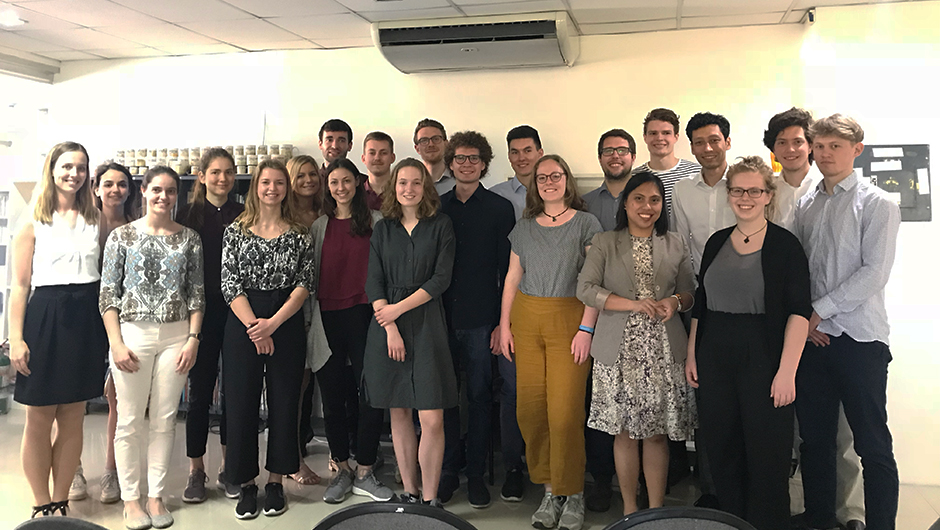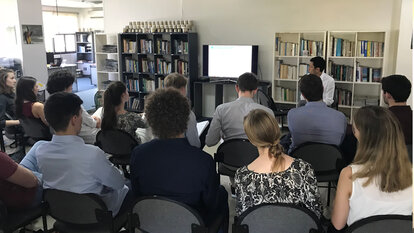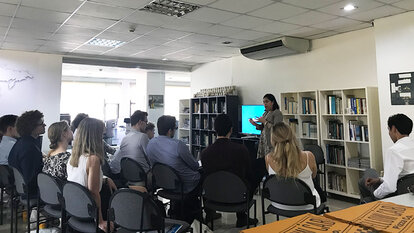Discussing Dev't Cooperation, Innovation&Erinnerungskultur with German Students

A group of about 20 Bachelor and Master graduates of the study courses B.A. International Economics and Development and the ensuing M.S. Economics had travelled from Bayreuth University to get acquainted with investment and development cooperation in the Philippines. When Wolfgang Heinze and Kristine Alcantara spoke to this German delegation from the University of Bayreuth, interest was noticeable.
Mr. Heinze's introduction highlighted the work of the Friedrich Naumann Foundation for Freedom (FNF) as well as the challenges awaiting political and economic action in the Philippines, which laid a good foundation for the ensuing discussion.

Trade lawyer and innovation expert Kristina Alcantara explained why the Philippines is " a good place to invest" – jokingly encouraging the students to: “Jumpstart the economy! Spend money here.”
She stressed that one of the favorable conditions enabling foreign investment is due to the widespread English skills. “If you encounter a customer service representative with schoolbook English accent on the phone, it’s probably a Filipino,” Alcantara said.
However, Mrs. Alcantara admitted that there is still room for improvement in terms of infrastructure in order to make investment more appealing. She cited the slow and poor internet access in the country as one of the biggest hurdles, an example all too familiar to the German audience. One of the reasons why this problem persists is the lack of competition among internet service providers in the Philippines, which is monopolized by two big companies.
After this introduction, the majority of the exchange was spent answering questions asked by the actively participating students.
Startups were of special interest as Alcantara once again invited the students to “bring technology to the Philippines,” praising the measures provided by the government to ease the founding of new businesses such as Startup Visa, local incubators in schools and universities, as well as a 6-month trial period to test and ease into the market situation. However, the problems in the status quo were also openly laid out: centralized industries, concerns of foreign investors regarding political stability, and oligarchs controlling big industries e.g. the construction business .
“Hopefully we will still be in good shape after 4 years,” Attorney Alcantara said.

Measuring success in foundation work was also a topic of interest with both speakers stressing the importance of continuous education work in light of the political situation in the Philippines as well as in Europe.
Confronted with the question: “Did foundation-work fail in the instance of rising right-wing ideology?” both speakers agreed that the rise of populist and strongman tendencies in otherwise democratic nations was a challenge and an ongoing struggle.
Both of them stressed the importance of “memorializing” dark periods of history – the holocaust for Germans, Martial Law for Filipinos - as an antidote to aforementioned tendencies. The German “Erinnerungskultur” (culture of remembrance) serves as a strong role model.
“Erinnerungskultur is important in order to avoid repeating past failures. Everybody’s support is needed in order to keep the memory alive,” Heinze said.
This dialogue between German students and FNF is part of study visit program that examines “Evaluation of Development Cooperation Projects in the Philippines”, organized by the University of Bayreuth’s International Business and Development program. The students will meet with local and international non-organizations, and will visit communities to understand the practice of development cooperation abroad.